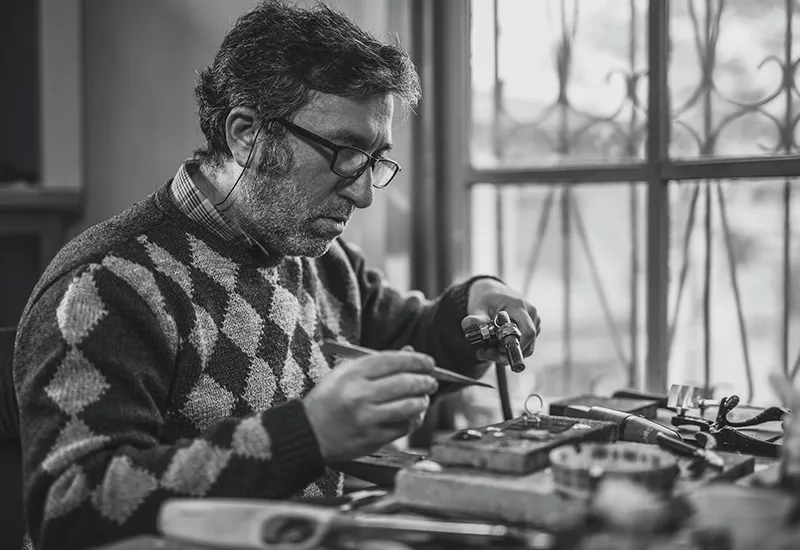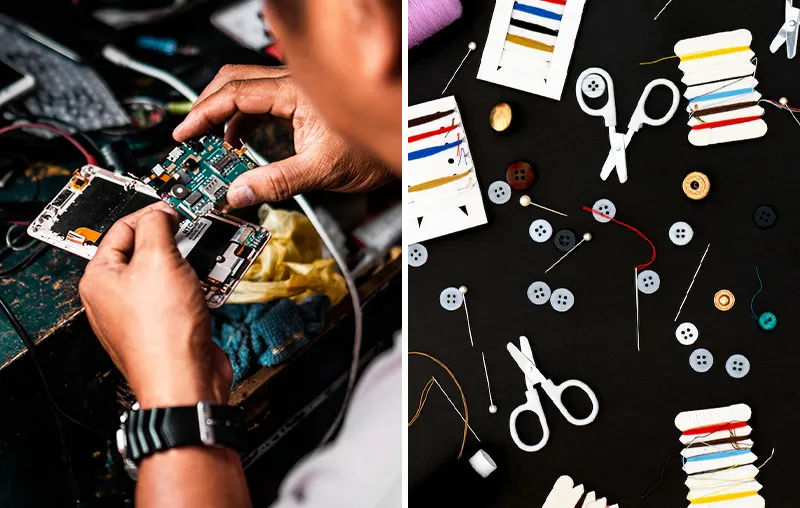How can you easily repair things instead of throwing them away? If you're looking for a helpful answer to this question, you've come to the right place! In our fast-moving society, things that no longer work can be replaced easily, quickly and 24 hours a day by buying something new online.
Unfortunately, many people have forgotten that a sweater with a moth hole can be mended or a damaged notebook professionally repaired. Laptop repair can be repaired. And with many benefits for the environment, society and your own wallet.
In this article, I would like to introduce you to my best tips for repairing things and extending the life cycle of your items. Use them, for example, to avoid a lot of waste and, above all, a costly new purchase. Let's go!
Advantages: Why should you repair things instead of throwing them away or buying new ones?

A repair is, for example, a Measure to restore the old, useful or aesthetic condition of an object. It is a basic human principle that aims to eliminate malfunctions and blemishes as far as possible.
But why go to all this trouble? After all, repairing a shirt with holes in it or a broken toaster can also be really time-consuming and laborious be. What's more, buying a new product online is so incredibly easy and convenient.
So before we move on to the tips, I would like to give you a few important ones, motivating reasons to repair one or two things more often in the future:
- Protect the environment: Repairs reduce human waste and conserve limited resources, natural resources of the earth. For example, every repaired device saves raw materials and the energy required to manufacture and deliver new goods - and thus also protects the climate.
- Save money: Obtaining spare parts instead of replacing an item in need of repair with a new one is often cheaper. At the same time, this is proof that save money through sustainability lets.
- Show appreciation: Repairing an object also means being aware of its value. It is also a way of respecting the effort required to produce it and promotes the formation of a responsible society.
- Looking for challenges: Buying new is a boringly simple way to solve a problem, don't you think? Repair, on the other hand promotes your creativityyour satisfaction and your problem-solving skills. After all, it takes ideas, a plan and a bit of craftsmanship to fix something that's broken.
- Maintain quality: Many old products are of higher quality and more durable than their modern counterparts, which often come with planned obsolescence are built. By repairing them when they need to be repaired over the decades, you preserve their quality.
10 tips: How can you repair things so you don't have to throw them away and buy new ones?

The Repairing is fun and definitely worthwhile - whether for the planet or your wallet. It is also an effective way to help our Throwaway Society counteract.
But How to manage to throw away less in practiceby reaching for a screwdriver, hammer or needle and thread more often? Here I present the promised ideas and tips that should make repairs much easier for you.
1. have the confidence to repair small things yourself
Have confidence in yourself and your abilities. You'll be surprised what you can fix, if you only try. Because many small repairs are easy to carry out yourself, even without specialist knowledge. For example, mending a seam on a sweater, patching a bicycle tire, gluing the sole of a shoe or replacing a shovel blade.
Such DIY repairs don't just save money in the end. They are also a great way to to promote practical, manual skills and increase your courage for future repair tasks.
2. commission professional repair companies
Whether it's a car, wristwatch, drill, dishwasher, camera, notebook, lawnmower or paddle boat - some everyday items are unfortunately not so easy to repair.
For example, my laptop suddenly had a pink screen. As a layman, there was absolutely nothing I could do on my own. Fortunately, there are repair service providers for such cases who Fast, safe and cost-effective help further.
With a watch in need of repair, for example, you can go to the Jewelry store or watchmaker go. And a faulty dishwasher is best left to the Service team of the respective brand or by a repair service on site. In the end, there is a solution for everything.
3. ask the manufacturer for spare parts
If you want to repair something instead of throwing it away, you should look for spare parts. The next time an appliance or appliance part breaks downyou can simply contact the respective manufacturer for information on repair parts or options.
That is indeed easier than you might think! Many companies have designed spare parts specifically for their products. A Call, a Search input at a sustainable search engine or a e-mail - and the razor, the shoe, the winter jacket and the wall light are perfect again.
4. get support at a repair café
In a so-called "Repair Café" (also known as a repair café), events are held in which participants can repair their repair broken everyday objects alone or collectively. You will find various tools as well as repair experts there.
So here you can Helping people to help themselves and are more likely to leave the café with a functioning, flawless item. A great way to get to know people and at the same time enjoy natural Conserve resources.
5. use repair instructions from the Internet
Have you accidentally broken something? For example, your phone screen, the zipper on your handbag or your child's favorite toy? Then don't panic! Because Blogs, forums and especially YouTube are real treasure troves for repair instructions of all kinds.
Use the experience, problem solutions and Step-by-step instructions other people to master your own repair challenge. They are generally easy to understand and follow. For really difficult repairs, it makes sense to contact a professional repair company.
I wouldn't necessarily describe myself as a handyman either - but with a little help from the internet, I can actually repair (almost) anything 🙂.
6. ensure repairability in the event of damage before making a purchase
You can lay the foundation for the principle of "repairing instead of throwing away" even before you buy an item. Simply check whether the smartphone, computer, jacket, washing machine or any other object of desire is in good condition. easy to repair (and independently) in the event of a defect is. You can do this, for example, by simply asking the sales staff.
If, for example Spare parts difficult to obtain or not available at all If you want to be more sustainable, we recommend that you opt for something else. Products that are easy to dismantle, for example, are often easier to repair and are therefore usually the more sustainable choice.
7. know your rights as a consumer:in
Consumer law may seem a bit dusty - but there are a few things you should definitely know when it comes to repairs. For example, according to Section 439 (1) of the German Civil Code (BGB), you as the buyer:in Demand subsequent performance if the purchased goods prove to be defective. In this case, you not only have the right to a new delivery, but also to rectification or repair. The choice is yours.
The coalition agreement also stipulates that the service life and the Repairability of a product is an important product feature represent. The so-called Right to repair should ensure that products are more durable and used for longer. For example, with the help of supplied Repair information and the uncomplicated disassembly on your own initiative.
It should much easier in the future and more interesting to repair things instead of throwing them away and buying new ones.
8. take advantage of the repair bonus from the state
You still need a financial incentiveto prevent defective but repairable electronic devices from becoming electronic waste? Then you should definitely look into the so-called repair bonus!
This is a publicly funded support program for the avoidance of e-waste, with which you can your paid repair costs partially refunded get. Unfortunately, the funding is not yet available throughout Germany. But in Thuringia and Saxony it was already a complete success.
9. talk to friends and neighbors about repair options
You have a lot of confidence in yourself, but after several attempts you can't manage to repair the busy object of desire? Then of course that's no reason not to try again with the help of the Swarm intelligence to try.
Among neighbors, friends, family members or work colleagues is actually always someone who has had a similar problem before and has THE DECISIVE SOLUTION at hand. For example, a good friend of mine is always my first port of call when I'm faced with unsolvable technical problems with my laptop.
10. try to repurpose the irreparable object

At some point, every thing probably dies. But even then, even if a particular item is actually and without any doubt irreparable, it doesn't have to go in the garbage can yetto the bulky waste or the nearest recycling center.
For example? Suppose you have a bicycle that is absolutely beyond repair or an old telephone that has now been overhauled and replaced by the latest technology. turn the bike into a unique decorative or advertising object create and the Telephone in a DIY project to make a desk lamp rebuild. With possible Upcycling ideas there really are no limits to your creativity and imagination.
Repairing instead of throwing away and buying new, made easy!
We simply can no longer afford to throw everything away straight awaywhen it no longer works. This is certainly also a mentality that we from our grandparents' generation can.
By repairing, refurbishing, mending and simply putting things back in order, we can, among other things, significantly extend their lifespan, conserve the planet's resources, save money, avoid waste and, at the same time, save ourselves money. Acquire manual skills.
In addition, the proud feelingWhen we get something working again or have repaired it, it is simply incredibly satisfying. So there should be no lack of motivation.
"The world changes by your example, not by your opinion."
Paulo Coelho (more at Zero Waste Quotes)
I really hope that I have been able to inspire you with these tips to repair more in the future instead of throwing away and ultimately buying new.
Do you have any questions, suggestions or your own experiences with repairs that you would like to share? Then I look forward to your comment.
Stay creative and sustainable,

PS: Repair is one of the many important principles of waste prevention. Zero Waste Lifestyle. Everything you need to know about it - and my most important Zero Waste Tips - you will find next in the linked articles. Have fun!









